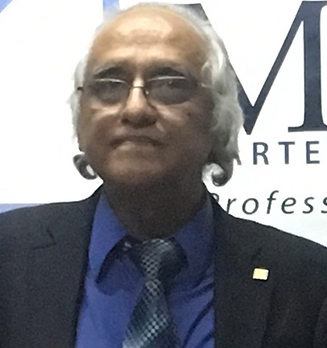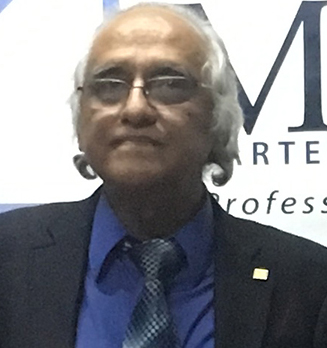Attorney and accountant Christopher Ram on Thurs-day criticised the David Granger administration for its mismanagement of public expenditure while having the largest single government in post-independence Guyana.
Ram issued the critique while speaking at the Private Sector Commission (PSC) business summit on Thursday as part of a panel discussion on taxation, where he also called on the government to release a recent International Monetary Fund (IMF) report on the country’s economy, which he said is critical of expenditure.
He used the forum to call on Minister within the Ministry of Finance Jaipaul Sharma, the lone government minister in the room, to state why the report had not been made public.
“Why is the government not telling us these things?” Ram asked.
“They shame,” was the response from the corner where members of the opposition were seated.
“But the PPP did the same thing,” he, however, shot back in reply.

Ram’s attempt to get an answer from the minister was thwarted by moderator of the discussion, the Chairman of the PSC’s Trade and Investment Committee Deodat Indar, who from the inception attempted to control the narrative of the panel discussion.
Also on the panel were Guyana Revenue Authority (GRA) Commissioner-General Godfrey Statia, Inter-American Development Bank (IDB) Representative Mark Wenner, and former attorney general Anil Nandlall.
Ram said the conversation on taxation has to start with the government’s management of public expenditure. He cited the low spending under the Public Service Investment Programme, pegged at 28% in June, and he questioned the projections that it will be between 90% and 95% in December.
“Is there some kind of manipulation of the numbers or is there irresponsible spending at the end of the year? Do these people who are supposed to be incapable managers suddenly become experts in the second half of the year and then you get to the next year and they become poor managers again?” he asked.
Meanwhile, Ram also said he stood by the recommendations made by the tax reform committee that had been appointed by APNU+AFC after it entered office and of which he was a part, but he said he had some problems with some of the actions that have been taken.
He referred to Minister of Finance Winston Jordan’s claim earlier this week that he had not introduced new taxes, and he said as member of the committee he felt insulted by the comment.
Ram questioned the tax on private education fees and water and electricity and he said that he found Jordan’s statement about not introducing new taxes “mindboggling.” “What does that suppose? That we have an ideal and an optimal system of taxation that we don’t need to trouble it?” he questioned.
He said there might be some sections of the economy that are heavily taxed and others that are not, while noting that Guyana has one of the worst cases of income and wealth inequality. “One of the worst cases you could find anywhere! Anywhere! Are we going to leave those things intact and do nothing about it?” he questioned.
Ram lamented the absence of a taxation, fiscal and governance policies. He also pointed out that there had not been an annual report of the GRA since 2010 and added that it was not known where taxes are being placed and where they are not being placed. “Do we honour the Constitution? Do we have the mechanisms for corruption mismanagement? Misspending? Misallocation? Do we have any of those things? The answer is no and are we addressing them? The answer is a resounding no,” he said, while noting that his comments are not only in relation to this administration as the former PPP/C administration misspent and the current administration is misspending.
‘Offence’
While Ram called out both the past and present administrations on their mismanagement of the country’s economy, Wenner called for the building trust and collaboration and working together.
“There is a litany of weaknesses, problems and issues in this country, so the issue is not that the tax is too high or is not that the government is not doing enough…the issue is more like how,” Wenner said in comments during a prior panel discussion he was part of.
“I think you can go on and try to fault find and place blame. If you can’t manage government programme and dialogue now, imagine when you have significant oil revenues coming in, it is going to magnify the amount of conflict. This is an opportunity to get ready for better times,” he said.
He called for more focus on one thing at a time, which should commence with building a sense of trust so there would be the realisation that development is not about one party but is about the next generation.
Earlier in the discussion, Roraima Airways owner Gerry Gouveia took offence to a comment made by Wenner, whom he did not name but who responded, which he said implied that the private sector is only interested in paying less taxes and using their gains for their own purposes.
“I want to say that personally I have been a businessman for over 25 years and doing my business with a social conscience… has been the hallmark of my whole existence. And I personally take great offence to that, the private sector today is a private sector that wants to pay our fair share of taxes,” an angry Gouveia said.
He said what they don’t want is an overtaxed private sector. “I take great offence to the insinuation that we are vultures and all we want to do is reduce taxes and we are not contributing,” he added.
Wenner had said in answer to a question from Indar that the private sector or business sector always wants to reduce taxes on itself so that can it have more money, while other sections of society are more concerned about other aspects, such as social welfare. He said that the problem with exemptions is that there is a lack of transparency and therefore the more there is a reduction of discretional applications of rules, it minimises the likelihood of favouritism.
Responding to Gouveia, Wenner said that it was never his intention to insinuate that the private sector was like a vulture. He said the question should not be about tax exemptions as against tax credits but about why exemptions became so demanding and so sought after, which is because the rates are so high.
He said it is not about the business sector wanting something as everyone would want lower taxes. “It is not like, you know, you are a vulture or you are irresponsible and not have a social conscience, that’s not the point. It is human nature—you want to pay less and control more of your resources, so that is standard…,” Wenner said.
He pointed out that when there are high rates, there will be a lot of people who will be involved in avoidance and evasion and they would mobilise connections to get exemptions and then there is a problem on the other side when there is not effective spending.
“So you are heavy on collecting revenues but you are not heavy on delivering good, quality proper goods and services and that creates some sort of public resentment. So I think that is more of the issue…,” he said.






